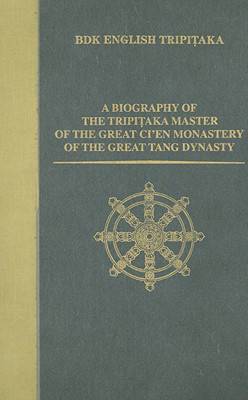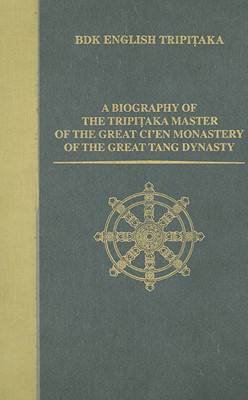
- Retrait gratuit dans votre magasin Club
- 7.000.000 titres dans notre catalogue
- Payer en toute sécurité
- Toujours un magasin près de chez vous
- Retrait gratuit dans votre magasin Club
- 7.000.0000 titres dans notre catalogue
- Payer en toute sécurité
- Toujours un magasin près de chez vous
A Biography of the Tripitaka Master of the Great Ci'en Monastery of the Great Tang Dynasty
Description
The Tripitaka Master Xuanzang (A.D. 600-64), whose deeds and career as a Buddhist monk are described in this biography, was a prominent figure not only in the history of Buddhist learning but also in other fields of culture. He played a role in the establishment of friendly contacts between China and the countries through which he traveled in search of more knowledge of Buddhism and incidentally but not insignificantly provided posterity with data of historical value in his detailed records about regions in central Asia and particularly in ancient India. He is thus respected not only by the Buddhists and people of China but also by the peoples of other eastern Asian countries who have benefited from the Buddhist lore that he acquired through many hardships and perils during his seventeen-year journey, from 629 to 645, in foreign lands. Because of his translation of Buddhist text into Chinese, Xuanzang was an epoch-making figure in the history of Buddhism in China.
Huili, the author of this biography, was born in 614 and became a monk at the age of fifteen. Out of his admiration for the Venerable Xuanzang, he wrote this biography about how the Master went to India to seek Buddhist texts and translate them into Chinese. The biography relates events up to the Master's arrival in the capital at the conclusion of his return journey from India and was compiled and edited by the monk Yancong, who added five fascicles to the original to relate the Master's activities after his return to China up to his death. He thus produced a more complete biography of the Venerable Tripitaka Master Xuanzang, which is presented here in the English version.Spécifications
Parties prenantes
- Editeur:
Contenu
- Nombre de pages :
- 386
- Langue:
- Anglais
- Collection :
- Tome:
- n° 77
Caractéristiques
- EAN:
- 9781886439009
- Date de parution :
- 01-05-06
- Format:
- Livre relié
- Format numérique:
- Genaaid
- Dimensions :
- 163 mm x 236 mm
- Poids :
- 816 g

Les avis
Nous publions uniquement les avis qui respectent les conditions requises. Consultez nos conditions pour les avis.





